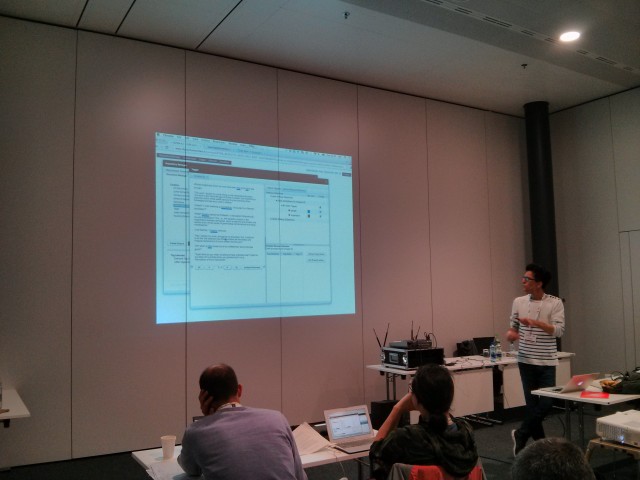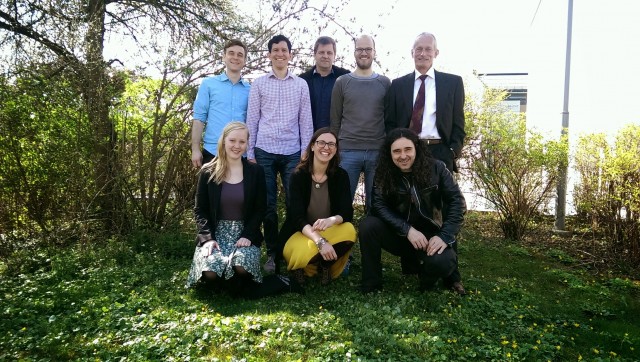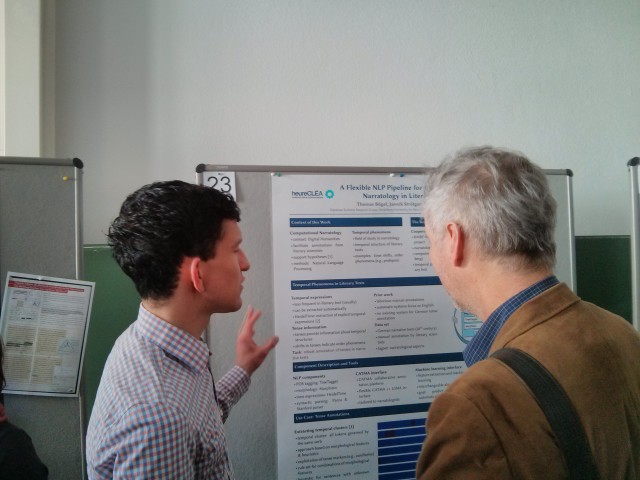Archive for 2014
-
Workshop: Narratological Concepts & Interpretation
By Janina Jacke on November 22, 201400Christian Folde from PHLOX and Janina Jacke from heureCLÉA are holding an interdisciplinary two-day workshop on Narratological Concepts and Interpretation. The workshop will take place in Hamburg, December 12th-13th 2014, in the AS-Saal of the Hauptgebäude. The titles of the talks are as follows: Tom Kindt – TBA Christiana Werner: “The problem with The Purple Rose of Cairo: fictional characters […] -
#DH2014 Tutorial
By Jannik Stroetgen on July 9, 2014 In the course of DH2014, the heureCLÉA team gave a tutorial on using CATMA as a collaborative annotation and analysis tool. In addition to CATMA, we also presented the first joint results of the heureCLÉA project: after a short introduction to HeidelTime and the flexibility of its underlying architecture (UIMA), we gave a demo on the integration of our automatic […]
In the course of DH2014, the heureCLÉA team gave a tutorial on using CATMA as a collaborative annotation and analysis tool. In addition to CATMA, we also presented the first joint results of the heureCLÉA project: after a short introduction to HeidelTime and the flexibility of its underlying architecture (UIMA), we gave a demo on the integration of our automatic […] -
Poster presentations at LREC 2014, Reykjavik
By Jannik Stroetgen on June 10, 2014 Here are our two posters that we presented at this year’s LREC in Reykjavik, Iceland: Computational Narratology: Extracting Tense Clusters from Narrative Texts. [poster] [paper] Extending HeidelTime for Temporal Expressions Referring to Historic Dates. [poster] [paper]
Here are our two posters that we presented at this year’s LREC in Reykjavik, Iceland: Computational Narratology: Extracting Tense Clusters from Narrative Texts. [poster] [paper] Extending HeidelTime for Temporal Expressions Referring to Historic Dates. [poster] [paper] -
heureCLÉA@DH2014
By Janina Jacke on April 9, 2014heureCLÉA will be represented at the Digital Humanities Conference 2014 in Lausanne with a paper (“Pushing Back the Boundary of Interpretation: Concept, Practice and Relevance of a Digital Heuristic” and a hands-on workshop. The conference takes place in Lausanne from 6 – 12 July. Visit the conference website: http://dh2014.org/ -
heureCLÉA in motion
By heureadmin on March 27, 2014 Taking the idea of annotation as a moving target to a new level: the heureCLÉA team at DHd 2014! Here’s an extract from the paper delivered by Evelyn Gius and Janina Jacke at the DHd 2014 on 28/3/2014: “Aufgrund des Zusammenspiels von literaturwissenschaftlichen – und speziell: hermeneutischen – Verfahren und informatischen Verfahren der Information Extraction und der Statistik stehen sich […]
Taking the idea of annotation as a moving target to a new level: the heureCLÉA team at DHd 2014! Here’s an extract from the paper delivered by Evelyn Gius and Janina Jacke at the DHd 2014 on 28/3/2014: “Aufgrund des Zusammenspiels von literaturwissenschaftlichen – und speziell: hermeneutischen – Verfahren und informatischen Verfahren der Information Extraction und der Statistik stehen sich […]
Contact Us
heureCLÉA
Prof. J.C. Meister & Prof. Michael Gertz (Uni Heidelberg)
c/o Department of Languages, Literatures and Media
University of Hamburg
Von-Melle-Park 6
D-20146 Hamburg
Prof. J.C. Meister & Prof. Michael Gertz (Uni Heidelberg)
c/o Department of Languages, Literatures and Media
University of Hamburg
Von-Melle-Park 6
D-20146 Hamburg



